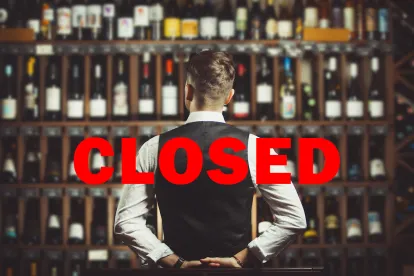Any spirit raising is a welcome one during the time of COVID.
As attorneys representing breweries, wineries, distilleries, retailers, and countless other businesses working within the hospitality industry across North Carolina, we have been a front-row witness to the industry's struggles during the COVID-19 pandemic. We have also seen our distillers, in particular, face the hurdles associated with North Carolina's historical liquor monopoly.
Last month, North Carolina state lawmakers made it clear that they, too, had witnessed those struggles. On September 10, Governor Cooper signed House Bill 890, omnibus legislation containing alcohol reform measures expected to benefit all business owners governed by the Alcohol Beverage Control Commission. Many of the provisions of the bill are focused on the state's nearly 100 distilleries.
Changes for Distilleries
In particular, the legislation, which passed on a 35-7 vote by the state Senate and a 95-8 vote by House members, levels the playing field for distilleries by making the laws applicable to them more consistent with the laws that govern wineries and breweries.
For example, distilleries were formerly unable to be open during hours when the local ABC stores were not open. Now, distilleries are able to offer tours, tastings, and can sell closed containers of their product to consumers for off-premises consumption seven days a week (9:00 A.M.-9:00 P.M. Monday through Saturday and Noon-9:00 P.M. on Sunday). Distilleries no longer are required to maintain records related to tours given to individuals who tour the distillery prior to purchasing a bottle of distilled spirits as required by N.C. Gen. Stat. 18B-1105(a)(4).
Distilleries or their representatives that obtain a spirituous liquor special event permit can now not only provide free consumer tastings at trade shows, conventions, local fundraisers, and farmers markets but can also sell mixed beverages or spirituous liquor distilled at the distillery at such events. Notably, however, the sale of mixed beverages in conjunction with a consumer tasting is not authorized at shopping malls, street festivals, holiday festivals, or balloon races. Finally, upon obtaining the appropriate permit, distilleries, will also be able to give one 50 milliliter mini-bottle per customer per day at trade shows, festivals, and other similar approved events.
Additionally, changes for consumers are also coming to State ABC stores. Consumers will now be able to place orders online and then pick up products from state ABC stores. Business owners will no longer have to make the drive to pick up liquor from ABC stores and warehouses - they will be able to order liquor and have it delivered to their retail locations, just as beer and wine are delivered.
The legislation also allows private label distilled spirits meaning that individuals and restaurants can contract to have products produced and labeled for them with a label that indicates that the product was "bottled for," "distilled for," or "in honor of," a particular individual, event, business, or cause.
The legislation creates a new permit known as a "nonresident spirituous liquor vendor permit" that can be issued to distilleries located outside of North Carolina that sell their products in the state; a brokerage of such products; or a spirituous liquor importer/bottler. The permit holder is allowed to sell, deliver, and ship spirituous liquor that has been approved for sale in North Carolina to the permit holder's employees in North Carolina and the permit holder's brokerage if the brokerage holds a nonresident spirituous liquor vendor permit for the purpose of conducting spirituous liquor special events. Shipments and deliveries are limited to the amount of spirituous liquor necessary for any consumer tasting event scheduled within one month of the shipment or delivery.
In areas where the sale of mixed beverages has not been approved, a distillery located on a property used for bona fide farm purposes may sell mixed beverages containing only spirituous liquor produced at the distillery for consumption on the premises.
Finally, a North Carolina Spirituous Liquor Advisory Council will be established, consisting of members with education or experience in the liquor or tourism industries. The Council members will receive no salary for serving but shall have powers and duties involving promoting public awareness and quality of the North Carolina spirituous liquor industry.
Retail Provisions Benefitting Consumers
Retailers of all types, and consumers, will also benefit from the legislation, which expands the legal size of a growler (for beer or wine) from 2 liters to 4 liters. Business owners will also have the right to make their outdoor dining extensions (and alcohol service areas) permanent and to sell alcoholic beverages for off-premises consumption throughout designated "social districts." Cities and counties will have the ability to carve out the social district areas, where locals and tourists can walk about with alcoholic beverages purchased within the social district. And those 'walktails' aren't the only new development; charter buses that travel at least 75 miles will now be allowed to serve alcohol. Finally, the expansion of on-premise sales into outdoor areas that was allowed temporarily, has now been codified. Retailers located in cities and counties that pass an ordinance allowing the extension of premises must follow the steps set forth in 18B-904(h) to have their premises extension approved.
Sports fans also have something to celebrate from the legislation. Athletic stadiums, facilities, and arenas at public universities and colleges in North Carolina can now sell two malt beverages or glasses of wine to a single patron at one time. That should cut down on the amount of time that fans spend in the drink line at sporting events.
Finally, the legislation extends ABC's jurisdiction to regulate not only alcoholic beverages but alcohol consumables. Alcohol consumables are defined as any manufactured and packaged ice cream, ice pop, gum-based, or gelatin-based food product containing at least one-half of one percent (.5%) alcohol by volume. These products were previously beyond the reach of the ABC system. The new legislation, however, will require that all manufacturers of such products to be registered in the state, that all products and labels for such products be approved by the Commission, and that such products only be sold through the appropriate retail channels.
Provisions Related to Special Event Permits
Vendor representatives of malt beverage, winery brands, and nonresident spirituous liquor brands can now qualify to hold a malt beverage, winery, or spirituous liquor special event permit, as applicable, to allow them to give free tastings of their products at shopping malls, trade shows, festivals, balloon races, farmers markets and fund-raising events approved by the Commission.
Conclusion
Businesses regulated by the ABC Commission have endured many challenges throughout the COVID-19 pandemic, which likely shed light on the historical challenges faced by North Carolina's distillers. Hopefully, this legislation's focus on modernizing liquor sales and promoting outdoor dining and social districts in North Carolina will lift all boats. The permitting process is nuanced and requires attention to detail.





 />i
/>i

